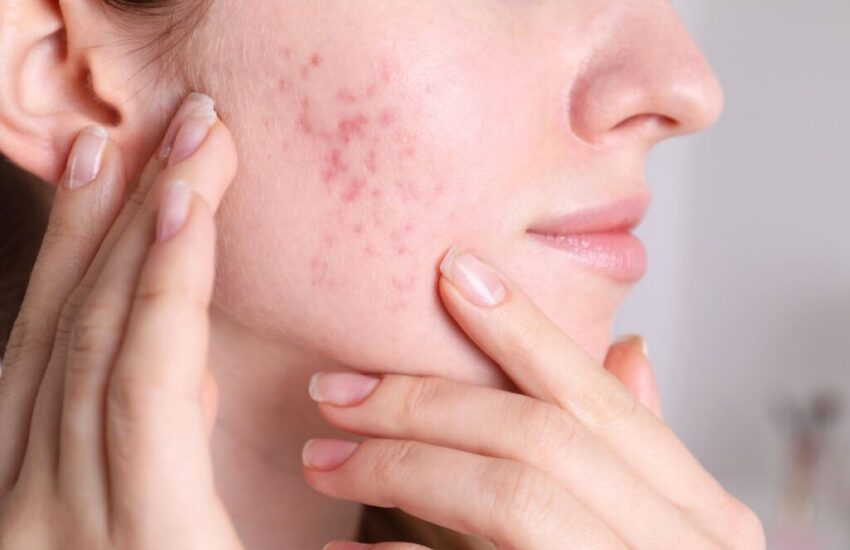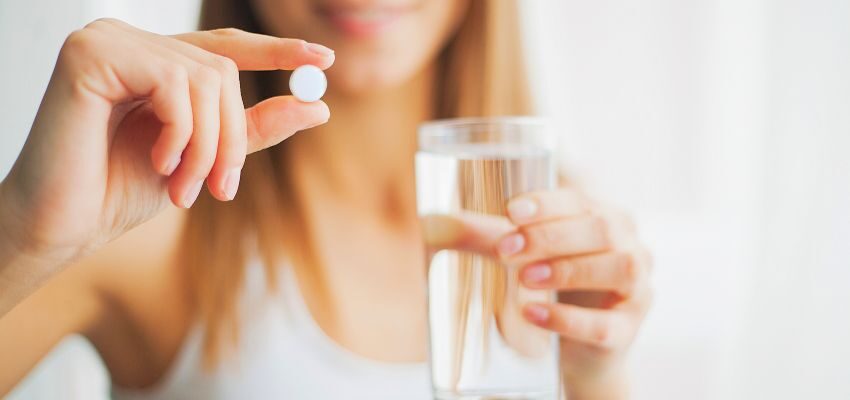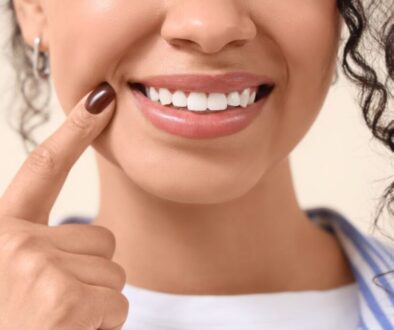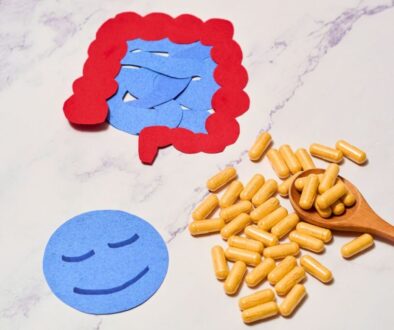Can You Treat Acne With Probiotics?

Published January 21, 2026
Acne affects 50 million Americans every year. For many, painful breakouts continue long after the teenage years. When topical creams and prescriptions fail, many look for a new approach. This raises a common question: can you treat acne with probiotics? Research on the gut-skin connection shows that “good bacteria” can impact skin health. It helps regulate inflammation and immunity. Instead of treating the surface, probiotics may address acne from within.
In this article, we’ll explore the gut-skin axis. We’ll also look at clinical evidence linking probiotics to acne management. We also offer practical advice for incorporating probiotics into a comprehensive skincare routine.
What Are Probiotics?
Probiotics are live microorganisms often called “good” bacteria. They provide health benefits when consumed in the right amounts. Probiotics help keep the body’s microbiome balanced. They prevent harmful microbes from overgrowing and support essential bodily functions.
Beyond digestion, probiotics are key to immune regulation. They train the immune system to react to threats. This helps lower systemic inflammation. Since inflammation often triggers skin issues, probiotics play a vital role.
How Probiotics Relate To Skin Health
The link between probiotics and skin health is known as the gut-skin axis. This pathway links your digestive system, immune system, and skin. A balanced gut microbiome supports the immune system. It also helps preserve a healthy skin barrier.
An imbalance, or dysbiosis, can cause inflammation. This may show up on the skin as acne, redness, or sensitivity. This connection explains why probiotics can be a helpful part of an acne management plan.
Understanding Acne: Causes And Conventional Treatments
Acne is a condition of the skin that has many causes. These include excess oil production, clogged hair follicles, inflammation, and Cutibacterium acnes overgrowth. Hormonal changes, like during puberty, pregnancy, or stress, can also increase oil production.
Genetics and diet play a role, too. Breakouts may be more frequent for people with a family history of acne. Diets that promote inflammation can also lead to more regular flare-ups.
Common Traditional Treatments
Most conventional acne treatments focus on managing visible symptoms:
- Topical treatments: Benzoyl peroxide and retinoids are common active ingredients. Benzoyl peroxide works by reducing bacteria. Retinoids work by increasing skin cell turnover.
- Oral medications: Antibiotics reduce inflammation and bacteria. Hormonal therapies help control oil production.
These treatments are often effective. However, they can cause side effects like dryness, irritation, and sun sensitivity. Long-term antibiotic use can also disrupt the gut microbiome. This often leads to imbalances. Probiotics aim to address these issues rather than making them worse.
The Science Behind Probiotics And Acne
The Gut-Skin Axis Explained
The gut-skin axis links your gut microbiome to your skin. It’s a two-way communication channel. New research highlights a link between gut health and your skin. Chronic, low-grade inflammation in the gut can travel through the bloodstream. This process often worsens existing skin conditions.
When the gut barrier is weak, inflammatory compounds can get into the bloodstream. This initiates an immune response, which can lead to acne flare-ups. Supporting gut health and microbial balance is a sensible way to manage acne.
Clinical Evidence For Probiotics In Acne
Clinical studies on probiotics and acne have shown promising results. In one trial, it showed that oral probiotics can reduce acne lesions and severity. Research on topical probiotics also shows improvements in inflammatory acne. They can also help improve skin barrier function.
Probiotics are not a complete solution. Yet, evidence suggests specific strains can help clear skin when used consistently.
How Probiotics May Help Acne
Probiotics may help manage acne through several key mechanisms:
- Reducing inflammation: Probiotics can calm systemic immune responses. This helps decrease the redness and swelling associated with breakouts.
- Modulating immune activity: They support balanced immune signaling. This helps prevent overreactions to acne-causing bacteria.
- Strengthening hormonal balance: New research shows a stable microbiome may help. It can regulate hormones that trigger excess oil production.
Types Of Probiotic Approaches For Acne
Oral Probiotics
Oral supplements work by balancing the gut microbiome from within. They address inflammation and immune function internally. This allows them to improve skin health on a deeper level. Scientists often study strains like Lactobacillus and Bifidobacterium. These strains can help reduce inflammation. They also support the vital connection between your gut and your skin.
Topical Probiotics
Topical probiotics work by supporting the skin’s natural microbiome. When applied directly, they strengthen the skin’s barrier. This creates an environment where acne-causing bacteria can’t thrive. These formulas can be particularly effective for soothing localized inflammation and sensitivity.
Probiotic-Rich Foods Vs Supplements
Fermented foods are ideal natural sources of probiotics. Try adding yogurt or kefir to your diet. Sauerkraut and kimchi are also wonderful options. These foods offer many general health benefits. However, supplements often provide higher and more consistent Colony Forming Unit (CFU) counts. They also contain specific strains that target issues like acne. For therapeutic purposes, supplements offer greater precision.

How To Use Probiotics For Acne
Choosing The Right Strains And Products
Probiotic effects are highly strain-specific. Choose supplements with strains backed by research. Look for ones that support skin and immune health, like Lactobacillus acidophilus, Lactobacillus paracasei, and Bifidobacterium bifidum. Ensure the product’s CFU count is guaranteed until its expiration date. Don’t rely on the count at manufacturing time.
Not all probiotics target the same areas. Gut health is widely discussed, but the oral and respiratory microbiome is just as important. It supports immune balance and helps regulate inflammation. Products like Bionaze use patented strains like BLIS K12™ (Streptococcus salivarius K12) and BL-04™ (Bifidobacterium Lactis BL-04). These strains target the mouth, throat, and nasal passages. These areas act as key immune gateways and help maintain microbial stability.
Integrating With Your Skincare Routine
Probiotics are a helpful addition but not a substitute for traditional acne treatments. They work well alongside gentle ingredients like salicylic acid or retinoids. However, overusing antibiotics can diminish their effectiveness. Many see results with oral probiotics. Pair them with a simple, barrier-supporting skincare routine.
Expected Timeline For Results
Probiotics work by gradually shifting your internal balance. Digestive benefits may appear within days. Skin improvements take longer. Consistent use is needed for several weeks to a few months.
Safety, Side Effects, And Who Should Be Cautious
Potential Benefits Vs Risks
Probiotics are generally safe and well-tolerated. Some people may experience temporary bloating when starting. Topical probiotics rarely cause irritation. However, always do a patch test before regular use.
Who Should Avoid Or Use Probiotics With Caution
Those with a weakened immune system should be cautious. The same goes for anyone with a serious underlying medical condition. Always consult a healthcare provider before taking probiotics. In rare cases, introducing live bacteria can pose health risks.
Frequently Asked Questions
Can you treat acne with probiotics completely?
No, probiotics cannot cure acne completely. Acne is a complex condition affected by genetics, hormones, and lifestyle. Probiotics can help reduce breakout severity and inflammation. However, they are not a definitive cure.
How long before probiotics show results on acne?
Most people observe improvements within 4 to 8 weeks of consistent use. This allows enough time for the gut microbiome to rebalance.
Which probiotic strains are best for acne?
Strains from the Lactobacillus and Bifidobacterium families are among the most researched. L. acidophilus and L. rhamnosus are often linked to reduced skin inflammation.
Can probiotics worsen acne?
In some cases, your acne may flare up as your microbiome adjusts. This is often called “purging” and should be temporary. If breakouts persist, you may need to try a different probiotic strain or product.
Are probiotic foods enough to treat acne?
Probiotic foods are good for your general health. However, they might not offer the high doses you need. For treating acne, consistent potency is key.
Can you use probiotics with other acne medications?
Yes, probiotics can usually be combined with conventional acne treatments. They may also help reduce common side effects. However, always consult a dermatologist before combining therapies.
Do probiotics help with acne scarring?
Probiotics help control and prevent inflammation. They are unlikely to heal existing scars. Yet, they may reduce the likelihood of new ones forming.
Why Choose Bionaze
Bionaze offers a targeted probiotic solution using two patented strains: BLIS K12™ (Streptococcus salivarius K12) and BL-04™ (Bifidobacterium Lactis BL-04). These strains are researched for the greatest effectiveness. Bionaze is different from gut-focused supplements. It supports the microbial balance in your ear, nose, throat, and mouth. These areas are key to your immune defense. This focus on strain quality and clinical validation allows it to stand out in the crowded probiotic market.

Probiotics And Acne: Supporting Clearer Skin From The Inside Out
Research shows that the answer to “can you treat acne with probiotics?” is promising but not straightforward. Probiotics aren’t an instant fix. However, they can promote clearer skin. They work by lowering inflammation and balancing the immune system. Probiotics can be a valuable part of long-term acne management. Combine them with a healthy diet, stress management, and consistent skincare.
Bionaze focuses on ear, nose, and throat health. Its microbiome-balancing properties are powerful. This highlights the strong link between internal wellness and clear skin. To support your body’s defenses, consider Bionaze. Its formula balances your microbiome to address systemic inflammation and promote healthier skin.
Benefit From The Latest Advancements In Probiotic Science With Bionaze
Bionaze is a proprietary blend of probiotics proven to promote ear, nose, and throat health, improve digestion, and support your immune system. The active ingredients BLIS K12, and BL-04 are considered among the best probiotics according to science.
Get 25% Off Your First Order when you use BIO25 at checkout!

This Content Has Been Reviewed For Factual Accuracy
This content has undergone thorough fact-checking by our team of internal experts. Learn more about the meticulous editorial standard for our website here.
ADVERTISEMENT

About The Author
Hi, I’m Corinne Grace, a proud nursing graduate from Riverside College with a flair for writing. I specialize in health and wellness topics, using my educational background to weave informative and attention-grabbing articles that appeal to a wide variety of readers.




